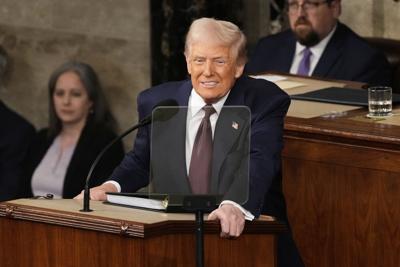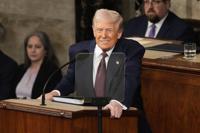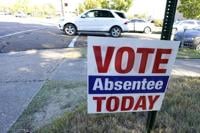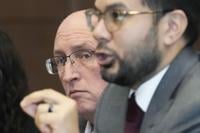Trump administration cuts to teacher training grants are putting a strain on rural school systems, which have relied on the money to help address teacher shortages.
In an overhaul at an agency President Donald Trump has described as being infiltrated by “ ,” the Education Department last month cut $600 million in grants to the training programs, which it characterized as supporting . Trump has said he wants to close the department, and new Education Secretary Linda McMahon has laid out how it .
Federal money makes up a significant portion of budgets in some rural districts, which rely more on grants and philanthropy because of their limited tax base, said Sharon Contreras, CEO of the Innovation Project, a collaboration among North Carolina school districts. A grant to that group supported teacher recruitment and retention, providing scholarships for teachers pursuing master’s degrees if they agreed to return to the area and serve as principals for three years.
“These districts struggle to attract teachers,” Contreras said. “They struggle to attract principals because they can’t compete with larger districts.”
Across the country, the grants paid student teachers to gain experience in classrooms, funded scholarships for aspiring teachers, and sent teachers to workshops to learn from peers. As recipients scramble to appeal the cuts, many say they could lead to fewer well-prepared teachers in classrooms, particularly in subject areas and regions already struggling with shortages.
“I think what’s unknown at this moment is how many individuals are going to continue to go into teaching, who may just have had their scholarships disrupted,” said Kathlene Campbell, CEO of the ��ɫֱ�� Center for Teacher Residencies.
The teacher residencies center and the American Association of Colleges for Teacher Education filed a lawsuit Monday seeking to reverse the grant terminations. It said the cuts unlawfully targeted several grant programs authorized by Congress.
On Thursday, eight Democratic state attorneys general filed a separate lawsuit over the cuts in U.S. District Court in Boston.
“These are programs that families and kids rely upon,” New Jersey Attorney General Matthew Platkin, whose office is one of the leaders on the case, said in an interview, “and if the president wants to get rid of them, the appropriate way to do it is through Congress.”
The Education Department did not respond to a request for comment.
As Trump pursues plans to , Elon Musk’s Department of Government Efficiency already has cut it dismissed as “woke” and wasteful, and the administration has scores of employees.
Last month, the Education Department sent letters to over a hundred grantees at universities and school districts saying teacher training programs were cut off because they involved initiatives than ran afoul of the Trump administration’s guidance. In a news release, it said the programs promoted what it called inappropriate topics such as critical race theory, social justice activism and instruction on white privilege.
Grant recipients rejected the notion that their work was related to DEI.
In rural South Carolina, one of the grants provided $13.5 million over three years to the Laurens 55 School District. It used the money to create 18 master teacher positions, train teachers, and pay bonuses when student test scores went up.
The program did not include any race-based hiring or teacher training, Laurens 55 Superintendent Jody Penland said.
“I think there was a priority point that kind of included in the grant something about ‘diversity,’” Penland said. “And you know, we took it as in, ‘How are we going to serve all of our kids?’"
In New Orleans, the NOLA SEED program used its grant money to help teaching candidates pay tuition at Tulane University. A partner organization recruited local high school students to take introductory college courses and to consider teaching careers — all to help address teacher shortages.
Another eliminated grant allowed history teacher Brian Grindrod in New Haven, Connecticut, to work with educators across the Northeast to involve their students in We The People, a civics education program that culminates in a mock congressional hearing. When he received an email telling him that work will have to wind down, he said he was angry.
“This strikes at the core of what education is all about,” Grindrod said.
Grindrod said the civics curriculum he worked on with teachers has been nonpartisan, with a focus on the history and framework of U.S. constitutional democracy. The training helped teachers engage students and apply civics education to real life, he said.
“This is a curriculum that looks at all sides of an issue from the constitutional perspective,” he said. “It allows students to develop critical thinking skills to look at all perspectives of an argument, to look at how some debates from the Federalists can still relate to today.”
One of Grindrod's own classes had traveled to mock Congress competitions at Yale University, competing against some of the state's most well-funded districts and earning an honorable mention.
Alex Walker, a junior, said it meant a lot to him to go to Yale and keep up with the other students. It was, he said, “probably the best history class I'm ever going to take in high school.”
Without the grant money, Grindrod said he doesn't know whether he will be able to help other teachers give their classes the same experience.
“The students are always the ones who lose out,” Grindrod said.
___
Anna Mitchell of The Post and Courier and Geoff Mulvihill of the AP contributed to this report.
___
The Associated Press’ education coverage receives financial support from multiple private foundations. AP is solely responsible for all content. Find AP’s for working with philanthropies, a of supporters and funded coverage areas at .








































